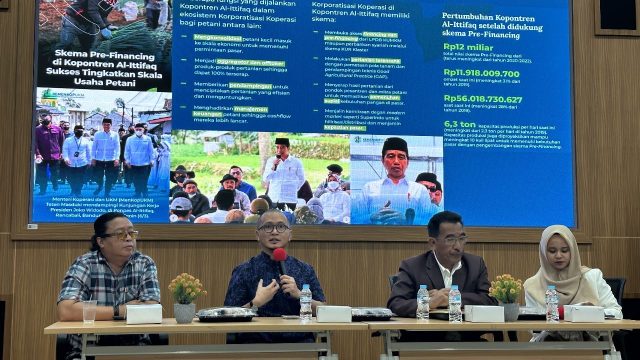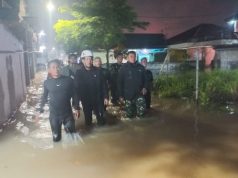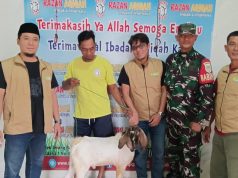CCN. SERANG – Sultan Ageng Tirtayasa University (Untirta), in collaboration with the Ministry of Cooperatives and Small-Medium Enterprises (Kemenkop UKM), ICCN, and Fekraf Banten, organized a public lecture seminar titled ‘The Strategic Role of Campus in Developing Creative Economy-Based SMEs.’ The event took place at the Convention Hall, Untirta Campus, Sindangsari, Serang Regency, on Monday (29/5/2023).
Present at the event were the Rector of Untirta, Prof. Dr. Ir. H. Fatah Sulaiman, S.T., M.T., Vice Rector for Cooperation, Information Systems, Partnership Strengthening, and Industry Services, Dr. H. Aceng Hasani, Drs., M.Pd., ICCN Chairman and Commissioner of Angkasa Pura II, Tubagus Fiki Chikara Satari, Chairman of Fekraf Banten, Andi Suhud Trisnahadi, Kabiro BAKP, Tb Bahtera Rohimudin, S.E., M.Si., Director of Untirta Press, Dr. Firman Hadiansyah, M.Hum., as well as coordinators, sub-coordinators, and other members of the Untirta academic community.
ICCN Chairman, Tb Fiki Satari, expressed the importance of the campus becoming an aggregator and collaborating with other campuses in developing the creative economy.
“We can collaborate with other campuses, such as those in Jakarta, Bandung, and Yogyakarta, so that there is a tornado or a significant force that we can initiate for the development of the creative economy in Banten, starting from Untirta and expanding nationally and even globally,” he said.
“Why do creative economy actors need to collaborate with campuses? Because what SMEs need is a locomotive that can pull the train. Campuses can play the role of aggregator and develop the potential and ecosystem for sustainable growth,” he added.
Meanwhile, Prof. Fatah stated that this is crucial and serves as evidence that Untirta continues to work for the community.
“We have a mandate from the ministry to assist the performance of SMEs in Banten. We have implemented programs such as the Matching Fund Kedaireka UMKM program, active throughout Banten, to introduce SMEs to the marketplace, as the impact is that their excellent products end up not being exposed. With the Kedaireka program from the Ministry of Education and Culture, these SMEs are now helped because they have their own marketplace,” said Prof. Fatah.
Vice Rector for Cooperation, Information Systems, Partnership Strengthening, and Industry Services, Dr. H. Aceng Hasani, M.Pd., mentioned the importance of collaboration with the community, government, and industry through the KSO/KSM cooperation pattern. He emphasized that the MBKM program necessitates collaboration.
“There are several implementations of the tridharma of higher education that involve optimizing collaboration with the business world, industry, government, and society. It must be collaborative. We also want to teach students to directly engage with the industry. Students must have networking or mentorship,” he said.
“We can create many things, starting from a convention hall, bookstore, sports hall, or other facilities to generate income for the campus, especially in relation to the commitment to becoming an independent higher education institution (PTNBH), where the campus must be self-sustainable in terms of financing,” added Dr. Aceng.
Andi Suhud, Chairman of Fekraf Banten, mentioned that currently, the creative economy actors in Banten, especially in Serang City, do not have dedicated venues or facilities to promote their creative economy.
“Until now, we have been renting land owned by Kopassus, Alun-alun, or stadiums for events such as concerts and activities related to the 17 subsectors of the creative economy. Hundreds of expenses are incurred for venue rentals in each event, and actually, we need a more representative venue. One of the potential venues is Untirta because it has a large land area. I hope the future venue will have an international standard,” he said. (HI/AAP/VDF/ast)”






